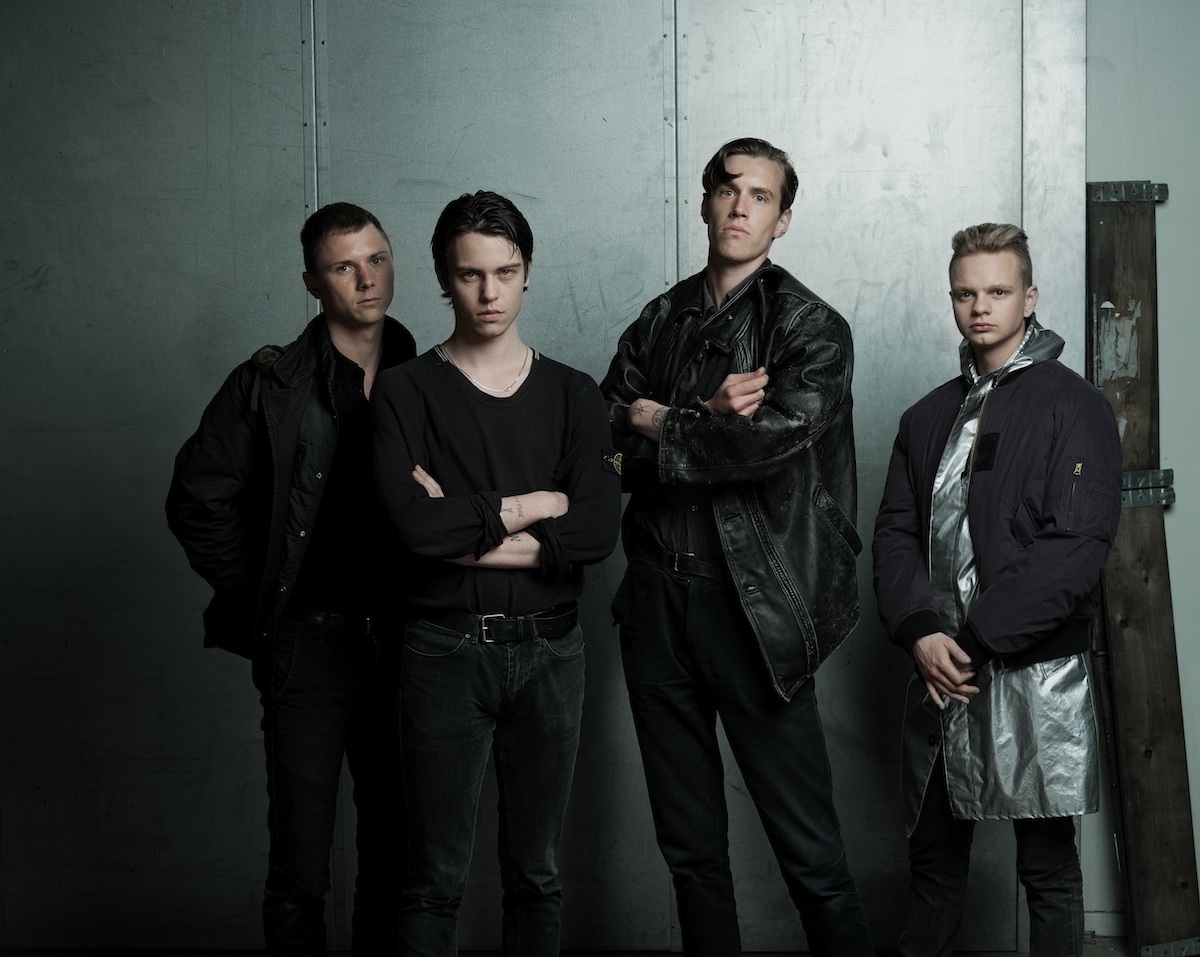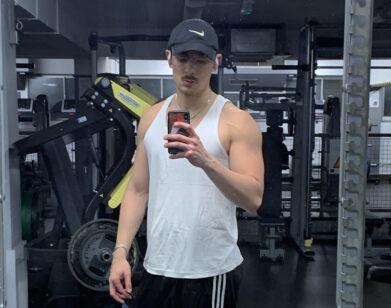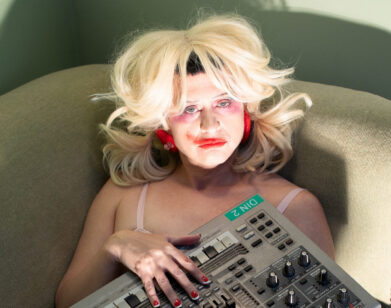Exclusive Song Premiere and Interview: ‘Into Distance,’ Vår

ABOVE: VÅR. IMAGE COURTESY OF FREDERIK LINDSTRØM
The music of Copenhagen-based act Vår may be uncompromisingly bleak, but the friendship between its members is anything but. Made up of four Danish musicians (Iceage‘s Elias Bender Rønnenfelt, Sexdrome’s Loke Rahbek, Kristian Emdal of Lower, and Lukas Højland), the band combines stark analog synths, percussion that rattles like factory equipment, and Rønnenfelt’s voice, which he wields with apocalyptic dread. Underneath the grit and grime of the band’s sound, however, is the bond between founders Rønnenfelt and Rahbek. From the band’s hypnotic, theatrical live show to its cover art, which in the past has featured the pair kissing, the project centers on the interplay between the two.
Recorded in a short amount of time with a limited set of tools, Vår’s debut LP, No One Dances Quite Like My Brothers, is a mixture of coldwave, post-punk, industrial, and ambient music, with few stylistic boundaries in sight. Tellingly, the record is being released release via Brooklyn label Sacred Bones, whose roster trends toward the ultra-hip and the ultra-dark. (Other bands released on the label have included Zola Jesus, Pharmakon, The Men, Cult of Youth, and more.) We caught up with Rønnenfelt and Rahbek to talk their debut record, recording with a limited palette, and the genesis of their friendship. We’re also pleased to offer the exclusive premiere of the band’s song “Into Distance,” below.
NATHAN REESE: How are you liking Brooklyn?
LOKE RAHBEK: I like it a lot. I’ve been here twice before. People are always like “Did you see this? Did you see that?” but I only ever saw clubs and recording studios. [This time] I went to Chelsea, and I went to MoMa, and I went to a Russian bathhouse and a Korean bathhouse.
REESE: Where was the Korean one? There’s a huge bathhouse called Spa Castle in Queens that I’ve always wanted to go to.
RAHBEK: Maybe that was the one I went to. I don’t know. It was in Flushing, I think. They had a bar. The Russian one was in the city, it was good too.
REESE: Can you tell me about the recording process for the album?
RAHBEK: We decided not to bring any instruments or write any songs and see if we could make a record in a week with the gear that was in the studio.
REESE: Was it hard to record so quickly, with such a limited set of tools?
RAHBEK: It definitely changed the process.
ELIAS BENDER RØNNEFELT: Well, in the beginning it was really limited [also], because we only had a 4-track and only worked with 4-tracks and whatever gear was lying around. In New York it was still kind of improvised. We just started recording, and we never know how things are going to turn out. They just kind of create themselves.
RAHBEK: We recorded at Heaven Street Records. It was really hot, and there wasn’t any air conditioning. And unfortunately, the owner of the studio, Sean [Ragon], has a fear of fans.
REESE: Wow, that’s an unfortunate phobia to have in New York. So you finished everything—writing, recording—all in one week?
RAHBEK: We didn’t record the vocals, because we didn’t have any lyrics. We finished those in Denmark a couple of months ago. But all the music was recorded in New York. We invited two of our friends to come with us to record and play the live shows. It was very much to see if we could to do this—to make something we weren’t familiar with. Not just another Copenhagen record. To make an American record.
REESE: Would you ever record like that again? How do you think you’ll approach your next record?
RØNNEFELT: I don’t know yet. We talked about maybe trying to record in the desert. We never really know what anything is going to sound like until we push the record button.
REESE: Was there anything else that inspired the record, other than the spontaneity of the recording process?
RAHBEK: The only other thing was this children’s book and movie called Bröderna Lejonhjärta [The Brothers Lionheart], about two brothers. The younger brother is very, very sick. He knows he’s going to die. The older brother is telling him stories about where he will go where he dies, called the Nangijala, the Cherry Blossom Valley. Then there’s a fire. They jump out the window and the older brother dies, carrying the sick younger brother on his back. Eventually, a while after, the younger brother dies as well. They meet up in the place and fight a dragon. It’s a great story.
REESE: That sounds really dark for a children’s book.
RAHBEK: It caused quite a fuss when it first came out. People were writing in their suicide notes that they were going to this place Nangijala. It’s not a Christian story; it has a different take on death.
If anything else should be mentioned, it should be that that we come from Copenhagen, all of us. We grew up in the ’90s, meaning that the first time I ever kissed anybody it wasn’t to a Joy Division song or something. It was to Euro dance music. For me, the sound of cheap electronic dance music is very much the sound of being young. Music and tools from this cheap dance music makes sense to me.
REESE: How did you and Elias originally meet?
RØNNEFELT: We’re both from Copenhagen. At first we didn’t know each other. We had different friends, but then we found each other and became one big group of friends.
RAHBEK: For a year before we met, people would come and tell me that there was this younger version of me. And people had apparently said the same thing to him—that there was an older version of you. So of course we hated each other. When we met we very quickly stopped hating each other.
REESE: Had you heard each other’s music before you met?
RØNNEFELT: Not really. He was doing Sexdrome and I was doing Iceage. We didn’t know each other until we started playing shows together.
REESE: How did you start playing shows together?
RAHBEK: He was playing in Iceage at the time. I was playing in another band called Addiction. Both of them were outsider bands in Copenhagen. All the other punks didn’t really like them. We figured out we could play shows together with those two bands, even though they were very different. Our friends and their friends were enough to have a crowd for the show. Then it became very obvious we should do something together. I took some classes at the school he went to at the time. We had a break for two hours every Thursday at the same time, and my rehearsal space wasn’t very far from the school. We would go every Thursday and record one song, and then go back. We did that for two months, and then we put out a tape.
REESE: The project itself seems to be very much about your friendship together.
RAHBEK: We got to know each other doing the project together. It was the first time hanging out. In that sense it is very much our friendship and our relationship. But there’s no dogma or rule about what the songs are about.
RØNNEFELT: [The album] is very much about being in New York, and living in a dream world for a couple of weeks. And still, it’s very much about the relationship between us.
REESE: Elias, considering how different Vår and Iceage are, how do you change how you approach the live show?
RØNNEFELT: The dynamics are all different, I’d say. Vår is a bit more theatrical, maybe. Everything is really scheduled. Everything is planned beforehand. Iceage more of a live experience, I guess. It’s hard to compare them. It’s very different.
REESE: Has the punk scene changed much over the last few years in Copenhagen? Do you steel feel like outsiders there?
RAHBEK: It’s very different now. I have a record label called Posh Isolation that I run with another guy from Copenhagen. We’re putting out noise and industrial stuff. When we started there nothing really made sense and there was nothing really going on, but if enough people pretend that something exists then it starts to exist all on its own. Now we have our own venue and our own label. There’s a lot of people in this crossover field, where its not about piercings and cowboy boots.
REESE: Are you a fan of other bands on Sacred Bones?
RØNNEFELT: We were friends with them before we signed with them. We toured with Cult of Youth. They recently signed Pharmakon, and she does vocals on one track on the album. She’s a very good friend. We have a bunch of friends on the label.
RAHBEK: Yeah, Sean [Ragon from Cult of Youth] recorded our album at his record store. And Margaret Chardiet, who does Pharmakon, is a very good friend of ours. Sean plays on the record too. It’s very much our crew, or whatever the term is.
NO ONE DANCES QUITE LIKE MY BROTHERS IS OUT MAY 14 VIA SACRED BONES. THE BAND WILL BE PERFORMING AT A MULTIMEDIA EVENT WITH PHARMAKON IN BROOKLYN MAY 25 AT THE RINK. FOR MORE ON THE BAND, VISIT SACRED BONES’ WEBSITE.






